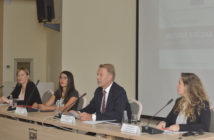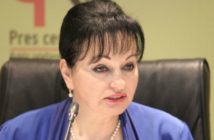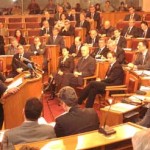 Parliament’s 2008 work plan set a timetable for plenary sessions and sessions of the parliamentary committees. But this work plan has not been fully met. 114 laws have been adopted since October 2007. This intense activity stems from the need to complete the legal framework of the country following its independence and adoption of the new constitution and should be commended. However, parliament has not made good use of its working bodies and observance of the rules of procedure remains problematic. Furthermore, inspection and control mechanisms provided in the rules of procedure are not being used appropriately. Parliamentary work is not yet efficient and transparent enough, in particular as regards timely planning of items for debate and provision of documents to parliamentary committees. However, some efforts have been made to increase transparency by making committee documents and complete transcripts of plenary sessions available on the internet. Individual and collective visits have been organised to familiarise the public with the work of parliament.
Parliament’s 2008 work plan set a timetable for plenary sessions and sessions of the parliamentary committees. But this work plan has not been fully met. 114 laws have been adopted since October 2007. This intense activity stems from the need to complete the legal framework of the country following its independence and adoption of the new constitution and should be commended. However, parliament has not made good use of its working bodies and observance of the rules of procedure remains problematic. Furthermore, inspection and control mechanisms provided in the rules of procedure are not being used appropriately. Parliamentary work is not yet efficient and transparent enough, in particular as regards timely planning of items for debate and provision of documents to parliamentary committees. However, some efforts have been made to increase transparency by making committee documents and complete transcripts of plenary sessions available on the internet. Individual and collective visits have been organised to familiarise the public with the work of parliament.
Parliament has significantly improved its oversight of defence and security bodies, which is a key priority of the European Partnership. However, there is still room for significant improvement of oversight over key aspects of the action of these bodies. The supervisory role of parliament generally remains weak.
The committee for international relations and European integration remains unfocused and its efficiency is limited. The long controversy over the election of its chair prevented, for a number of months, the setting-up of the Council for EU integration. Contacts with the European Parliament and Council of Europe Parliamentary Assembly bodies remain limited.
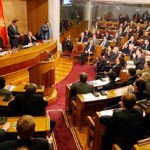 Strengthening of human resources has been relatively limited. Administrative and other resources required for parliament’s work, including expert support, remain insufficient. Plans are being prepared to increase staff numbers substantially. There is no framework for systematic training of staff but some training efforts have been made with the support of international and bilateral donors. Staff remuneration levels have been significantly increased.
Strengthening of human resources has been relatively limited. Administrative and other resources required for parliament’s work, including expert support, remain insufficient. Plans are being prepared to increase staff numbers substantially. There is no framework for systematic training of staff but some training efforts have been made with the support of international and bilateral donors. Staff remuneration levels have been significantly increased.
Parliament still lacks the capacity to scrutinise adequately the compatibility of new legislation with EU legislation. Financial management, including by parliament’s Secretariat-General, is still not sufficiently transparent. The State Audit Institution has not yet conducted an audit of the financial operations of parliament.
Further progress is necessary with regard to mature and consensual use of parliament. Debates on issues such as the appointment of members of the council for public broadcasting, television coverage of parliament sessions and the text of the presidential oath have resulted in boycotts by opposition parties. The governing coalition has responded with expedient procedural and legal solutions which have sometimes polarised political positions.
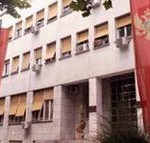 A disagreement between government and opposition on TV coverage of parliamentary debates resulted in a boycott of parliament by the opposition in spring 2008 which hampered efficient parliament work until a temporary solution was found in early October 2008. There has been controversy over adoption and implementation of the Law on electoral rolls. Implementation of the Law by municipalities has been successfully challenged in the administrative court by voters in some cases. Legislation on campaign financing has still to be adopted. Although some temporary arrangements were put in place for the presidential elections, including on media coverage, there is a need to address these issues with a view to forthcoming elections. Concerning the overall election framework, further challenges include the need to ensure full separation between State and party structures in the electoral administration as well as transparency in allocation of MPs’ seats.
A disagreement between government and opposition on TV coverage of parliamentary debates resulted in a boycott of parliament by the opposition in spring 2008 which hampered efficient parliament work until a temporary solution was found in early October 2008. There has been controversy over adoption and implementation of the Law on electoral rolls. Implementation of the Law by municipalities has been successfully challenged in the administrative court by voters in some cases. Legislation on campaign financing has still to be adopted. Although some temporary arrangements were put in place for the presidential elections, including on media coverage, there is a need to address these issues with a view to forthcoming elections. Concerning the overall election framework, further challenges include the need to ensure full separation between State and party structures in the electoral administration as well as transparency in allocation of MPs’ seats.
Overall, there have been some improvements in the functioning of parliament. There is an overall commitment to working on the basis of consensus, in particular on EU integration, but obstacles are still preventing turning this commitment into practical implementing arrangements. Enhanced resources and more effective use of parliamentary committees remain necessary.
European Commission, Montenegro Progress Report 2008

